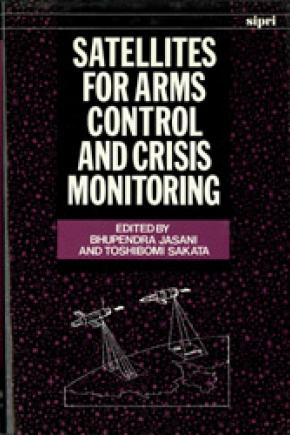Satellites for Arms Control and Crisis Monitoring
This book shows how the use of reconnaissance satellites could be expanded to benefit the international community. A number of international experts review the technological requirements for satellite monitoring of arms control agreements and show that there is no serious technical obstacle to implementing an international satellite monitoring agency along the lines suggested to the United Nations in 1978. If reconnaissance capability were put under international control, crises could be monitored and international stability increased. The potential of modern remote-sensing technology is illustrated with satellite photographs of areas of conflict (the Iraq–Iran War), and catastrophes (Chernobyl). The data available from civilian satellites approach those required for many verification tasks in the arms control context.
Nevertheless, the idea of an international satellite monitoring agency faces major institutional and political problems. Since it cannot be achieved without the co-operation of the superpowers, contributors focus on the possibility of a regional agency, first of all in Europe, where space reconnaissance could well become one of the next generation of confidence- and security-building measures. The possibility of a satellite system shared by the neutral and non-aligned states is also discussed.
Part I. Satellite monitoring—programmes and prospects
Bhupendra Jasani
1. Introduction
2. Sensor capabilities
3. Satellite programmes
4. International versus regional monitoring system
5. Summary and conclusion
Part II. Remote-sensing technology and arms control monitoring
Paper 1. The utility of civil remote-sensing satellites for arms control monitoring
Frederik J. Doyle
Paper 2. Technological requirements of a satellite monitoring system
Tatsuro Matsumae, Toshibomi Sakata, Haruhisa Shimoda and Masuhiro Etaya
Paper 3. State of remote-sensing technology in Europe
Philipp Hartl
Paper 4. Technology requirements for a satellite monitoring agency focused on Europe
Torleiv Orhaug
Paper 5. Verification of an international agreement banning chemical weapons—the possible role of satellite monitoring
Ralf Trapp
Part III. Institutional and political issues
Paper 6. Big Brother and the holding company: The political challenge of all-nation satellite monitoring
Roger Molander
Paper 7. A framework for a regional satellite monitoring agency in Europe
Michel Guionnet
Paper 8. The ISMA proposal and the European political climate
Caesar Voûte
Paper 9. Verification in arms control and disarmament treaties and negotiations—towards a European satellite verification system?
Ola Dahlman
Paper 10. A satellite monitoring agency for the Asia and Pacific region: Political aspects
Takeo Sasagawa
Appendix 1. Satellites launched in 1984 and 1985

